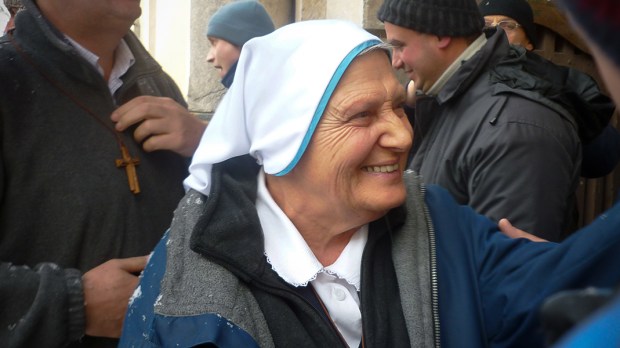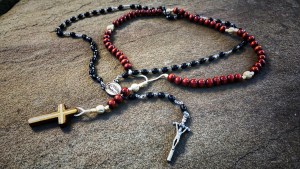Lenten Campaign 2025
This content is free of charge, as are all our articles.
Support us with a donation that is tax-deductible and enable us to continue to reach millions of readers.
It’s a story that, unfortunately, is becoming more and more familiar. “Kevin” had a degree from a university and a good job at a logistics company when he suffered a back injury. He got prescription painkillers but eventually found that he couldn’t live without them. And then he started using harder stuff.
“I was working at a good job and had the money to support my habit for a while, so it wasn’t evident in my family I was using pills and using heroin,” he said. “I drank a lot and used drugs in college, and it caused problems in my life and relationships. But it wasn’t until I started using heroin that I really started to develop a true drug addiction where I would wake up and have to use drugs every day to go about my daily life or to feel normal or just to operate.”
Kevin ended up in prison for armed robbery. After all, he had a $400-a-day addiction to subsidize. A priest who visited him regularly suggested that he might be a candidate for “Comunità Cenacolo” (Community of the Cenacle), which was founded by an Italian nun to help young men and women struggling with alcohol and drug addiction.
Granted probation in late 2013, Kevin entered the Community house Birmingham, Alabama. It’s one of four houses in the United States that is part of the international Comunità Cenacolo, founded in Italy by Mother Elvira Petrozzi in 1983. Houses operate in 18 countries around the world. A new one is about to open in Costa Rica, according to Albino Aragno, who oversees the communities in North America.
Leaders of the organization requested that family names of those interviewed not be used in this article.
“We eat good”
Drug abuse knows no national borders. But the United States seems to be undergoing a particularly sharp rise in the number of people addicted to opioids, both legal and illegal.
As Christopher Caldwell noted in a recent article in First Things, 52,000 Americans died of overdoses in 2015 — “about four times as many as died from gun homicides and half again as many as died in car accidents.”
Comunità Cenacolo doesn’t deal exclusively with drug addicts but has its fair share.
“Almost all of us are drug addicts,” said Kevin, 35, “but some have life struggles, or they need to get their spiritual life back in order.”
Mother Elvira referred to The Cenacle Community as a “school of life,” focusing on work, prayer and interpersonal sharing. It does not have medical professionals or counselors on staff to lead addicts and alcoholics through a particular method of treatment.
“We propose a simple, disciplined, family style of life, based on the rediscovery of the essential gifts of prayer and work (‘’ora et labora’‘), true friendship, sacrifice, and faith in Jesus,” explains the organization’s website. “The spirituality of the Community is centered on the Eucharist and the Blessed Mother. The day is structured around times of prayer (Eucharistic Adoration, the Liturgy of the Hours, the Rosary), work, deep sharing about one’s own life in the light of the Word of God, recreation, and times of celebration. We believe that the Christian life in its simplicity and fullness is the true answer to every restlessness in the human heart and that, in the living encounter with God’s Mercy, man is reborn into hope and is freed from the chains that have enslaved him, thus discovering the joy of being loved and of loving others.”
Each house for men has about 20-25 residents, usually between the ages of 18-39. The daily routine begins with a wakeup call at 6 a.m. and follows a rigorous structure that includes time in chapel, workshop and garden.
“We do everything here: gardening, we take care of the grounds, we do building. All the benches you see, all the porches,” Kevin explained as he gave a tour of the 10-acre Our Lady of Hope men’s community in St. Augustine, Florida, which he now co-directs. “This time last year we redid the whole roof. We pray, we work and we share — the three things we do in community.
“And we eat good as well.”
“Recognize the things we need to change”
That last, he added, is important for morale.
In addition to regular household chores, including cooking, growing crops and raising hogs (which gives someone a daily, though not entirely pleasant, task of cleaning out the sty), the community is engaged in woodwork, making anything from furniture to the crosses for rosary beads (which a nearby women’s community finishes off). There’s a church across the state highway where the men recently refinished the pews.
The prayer aspect of the life here includes Mass two or three times a week, recitation of three rosaries a day, adoration of the Blessed Sacrament, and Gospel sharing.
If it sounds like a quasi-religious community, here’s something else: there’s a strong emphasis on living a communal life and limiting material possessions.
“When I entered, my initial challenge was detaching from the world,” said Samantha, who joined three and a half years ago. “I come from a family that’s pretty well off, so I was spoiled and taken care of my whole life.”
Samantha, 30, who was addicted to painkillers and anxiety medication and started using heroin, said the initial adjustment to the community was hard: “working all day long and not having everything at your fingertips, waiting for things, not always hearing the word ‘Yes,’ detaching from material things. We live a really simple life here,” she said.
“We have no money, no wallets, no cell phones, so we can focus on … what we need to focus on, to recognize the things we need to change, the things we need to grow,” Kevin added. “When I used drugs I covered up everything. I didn’t want to deal with my emotions so I got high instead.”
“We don’t have TV, newspaper, phone or internet. No computer,” said 22-year-old Eileen. Those things can keep community members from communion with one another. Without them, a member isn’t able to escape from difficult confrontations.
“So we learn how to have a conversation with somebody,” Eileen said. “We have two girls who do housecleaning together every morning, and whether you got in a fight with that girl or you get along, you’re still working together. So you learn to be consistent in a friendship. And it’s hard.”
“We think we’re here because we use drugs, but it’s a lot deeper than that. Why did we resort to that? It was maybe because we never learned to communicate ourselves.
Eileen
In the life they left behind, she added, addicts were constantly running away from difficulties. “We changed jobs or changed schools, we unfriended the person on Facebook — you get rid of people you don’t get along with,” Eileen said. “We think we’re here because we use drugs, but it’s a lot deeper than that. Why did we resort to that? It was maybe because we never learned to communicate ourselves. Maybe we felt hurt or maybe we felt forgotten, maybe we ran and ran and ran and felt like nobody ever truly knew us. All these underlying things are the reasons why we started to abuse.”
Now, in the daily situations of life, she said, “you build your character so that you’re able to say no in all kinds of situations.” That will be helpful when community members leave and return to the world, where there will surely be temptations.
“Drugs and alcohol are always going to be there — and even more accessible than in my times, cheaper,” said Aragno, who came to Cenacolo some 40 years ago as a drug addict. “For them, the challenge is to sustain the life they have learned in community and be able to keep the faith and stay away from the old environment. And in a time when everything is global it’s much more difficult. You used to be able to move away from bad influences, but now everyone can too easily be found on the internet.”
Fraternal correction
At Cenacolo, there are times built into the schedule for sharing and “fraternal correction.” In a session called “revision of life,” community members gather every two weeks in groups of four or five. One at a time, each person shares about his feelings, his prayer, his work, his relationships with the other members, his struggles, and his behavior since the last revision of life. He also tells how well he maintained the particular “commitment” he was given at the last session.
“Then one at a time, everyone else tells you what they see in you, corrects you or encourages you,” said Aragno. “You are not allowed to respond, not allowed to explain why you are acting like that…. They give you a commitment. If you are lazy, never on time, you have to be first in every activity in the community, or if you are struggling, closed in on yourself, they give you the commitment to talk to a different guy every day, open up, come out of your shyness.”
As Samantha said, “There’s no distracting or disappearing or hiding or escaping anything. You deal with yourself here, and that’s that. There’s no running. You deal with stuff here.”



